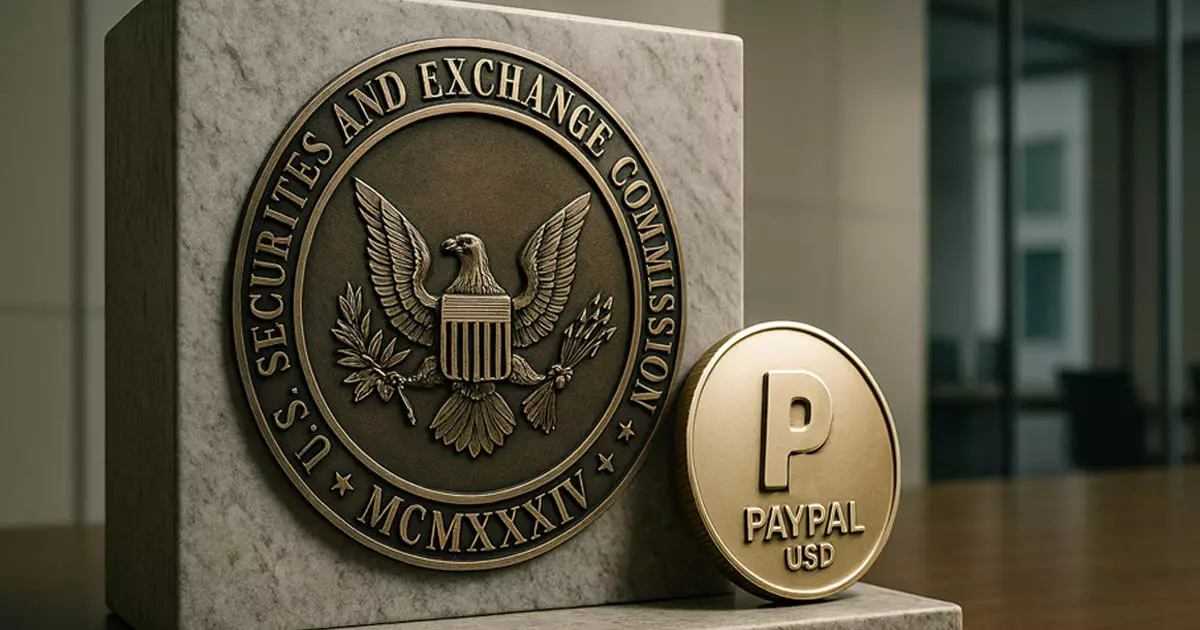The U.S. Securities and Exchange Commission (SEC) has decided not to pursue enforcement actions against PayPal’s stablecoin, PYUSD, marking a significant turning point in the evolving landscape of digital currencies. The information disclosed in PayPal’s latest financial filings indicates not just the cessation of scrutiny but also hints at a future where the regulatory climate may be more receptive to innovation in the fintech space. Investors and industry stakeholders can view this not merely as a legal victory but rather as a proclamation of confidence in the potential for stablecoins, especially those backed by U.S. dollars, to play an indispensable role in the financial ecosystem.
The stablecoin market is fraught with regulatory uncertainty; nevertheless, the non-pursuit of enforcement by the SEC could serve as a catalyst for similar tokens, indicating that the agency may be easing its previously aggressive stance. This suggests a rare moment where the regulators are opting to allow certain frameworks to flourish, rather than casting a wide net of enforcement.
PayPal and Its Strategic Vision
Launched only in August 2023, PYUSD is built on the promise of being the first payments-oriented stablecoin from a well-established U.S. fintech company, a feat that should not be underestimated. Backed entirely by cash and U.S. Treasury Bill reserves, PayPal has committed to maintaining transparency by providing regular attestation of these holdings. This initiative aims to access the lucrative market of over 20 million small businesses, offering them the promise of settling their payments in PYUSD by 2025.
Not only does this strategy allow PayPal to sidestep the traditional credit card networks that dominate the market, but it also positions the company at the forefront of a shift towards digital transactions. PYUSD is not an isolated invention; rather, it represents a larger vision for an integrated payment system that could quite feasibly redefine how transactions are carried out across multiple platforms, including Venmo.
The Bipartisan GENIUS Act: A Framework for Stability
Amid all this, the legislative ecosystem appears to be waking up to the realities of digital currency. The GENIUS Act, a bipartisan proposal in the Senate, aims to establish a regulatory framework that would define how payment stablecoins like PYUSD are handled in a legal context. The act proposes clear licensing frameworks, ensuring that these coins are backed at a 1:1 ratio and mandating strict monthly disclosures. While some skeptics question whether Congress can act decisively, the fact that lawmakers are even discussing such frameworks represents a shift towards pragmatism.
The need for such measures is amplified by the contrasting positions in the regulatory space. The former SEC Chair Gary Gensler’s rhetoric suggested a crackdown on cryptocurrencies, often categorizing many tokens as unregistered securities. With his exit, the SEC’s recent actions reflect a more tempered, perhaps collaborative approach, indicating that companies might be able to innovate without the constant fear of legal blowback.
A Cautious Future: Risks and Responsibilities
While there are exciting developments, caution is warranted. As PayPal marches forward with the implementation of PYUSD, it is also contending with varying degrees of legal uncertainties around digital asset storage. The company has openly acknowledged the inherent risks related to crypto-assets, stating explicitly that these funds could be mishandled in insolvency scenarios. Users need to be conscious of what custodial services entail; protections typically afforded to traditional assets may not apply.
Furthermore, other investigations into PayPal are still active, including a review from the Consumer Financial Protection Bureau regarding its credit practices. Although these inquiries are unrelated to PYUSD, they highlight the turbulent waters in which even major players in the financial sector must navigate.
The Call to Action: Embracing Change
In sum, the termination of the SEC’s inquiry into PYUSD exemplifies a moment ripe for innovation yet laden with responsibilities. As PayPal moves forward, industry players should prepare to embrace adaptive strategies while advocating for comprehensive, sensible regulation that does not stifle growth. The stablecoin ecosystem stands at the crossroad between innovation and legal scrutiny; the decisions made today will shape the financial landscape of tomorrow.

















Leave a Reply